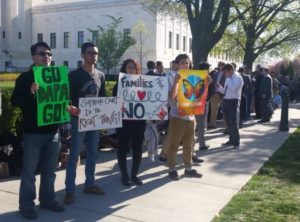
WASHINGTON—The U.S. Supreme Court considers the fate of as many as 4 million undocumented immigrants Monday, as justices hear opening arguments in a landmark case debating the legality of President Barack Obama’s executive actions on immigration.
The justices’ decision will have far-reaching implications on executive actions by future presidential administrations and comes at a time when the nation’s flawed immigration system is a constant focus of election-year debate.
The lawsuit in U.S. v. Texas asks the court to consider whether the president’s 2014 executive actions deferring deportations for some undocumented immigrants are within the government’s authority to direct immigration policy, or whether the president exceeded his constitutional authority by making new immigration laws.
Pending lawsuits
A decision in the Texas lawsuit will affect pending lawsuits in 25 other states opposing the president’s immigration actions.
Government lawyers are expected to argue that the federal government has the authority to direct immigration policy and can exercise its discretion in deciding priorities for the deportation of undocumented immigrants.[xyz-ihs snippet=”adsense-body-ad”]
“It is exclusively the domain of the federal government to decide who gets to stay and who gets to go,” said Angela Kelley, the executive vice president at the Center for American Progress Action Fund.
President Obama’s November 2014 executive actions expanded and created programs deferring deportation for the undocumented parents of legal U.S. citizens and residents, and for undocumented immigrants who arrived in the country as children.
The programs open up the opportunity for legal work permits but do not give applicants a path to permanent residency or citizenship.
Kelley said Obama’s executive actions build on decisions from past Democratic and Republican administrations to prioritize the deportation of undocumented immigrants with criminal histories rather than deporting undocumented children and immigrants with ties to the U.S.
Opponents say the Obama administration has not made a convincing constitutional argument for its actions.
‘Without historical precedent’
“What the president is doing here is without historical precedent in the history of the country,” said Dan Stein, president of the Federation of Americans for Immigration Reform. “You have one political party that is saying, ‘We’re going to double down and exclude Congress, exclude the American people and not worry about what they’ve said about the rules.’ ”
Obama said his 2014 actions directing immigration enforcement priorities were a result of Congress’ failure to act on immigration reform.
But Stein said a Supreme Court decision in favor of the federal government would disenfranchise Congress and the American people.
“All the states are trying to do is ask the federal government to carry out its obligations faithfully under the Constitution,” he said. “To say no one person can be a judge, a jury and also a lawmaker at the same time, as well as claim their actions are not reviewable.”
Earlier in the year, Congressional Republicans filed a brief with the Supreme Court supporting the lawsuits, writing “neither any immigration law now on the books, nor the Constitution empowers the executive to authorize — let alone facilitate — the prospective violation of those laws on a massive class-wide scale.”
Oral arguments
Representatives for House Republicans will have 15 minutes on Monday to present oral arguments.
The absence of a ninth Supreme Court justice – after the passing of Justice Antonin Scalia in February – could result in a split 4-4 decision that just decides the Texas lawsuit.
Only a majority decision of the Court can set a precedent so the other 25 lawsuits would work their way through lower state courts for individual decisions.
While the case hinges on interpretations of U.S. Constitutional law, Kelley said the human impact of a decision will be measured internationally.
“This is where we could really shine as a nation and show leadership at a time when the world is really grappling with what we do with undocumented populations and refugees,” she said.
The Supreme Court will announce the decision in June.
Source: VOA [xyz-ihs snippet=”Adversal-468×60″]
